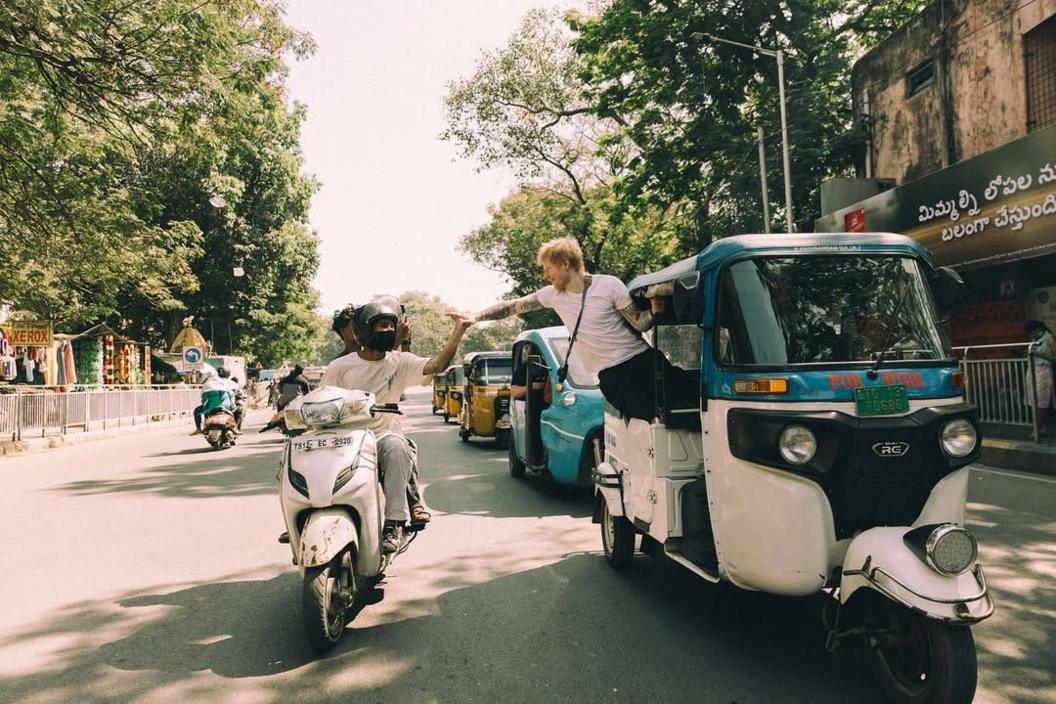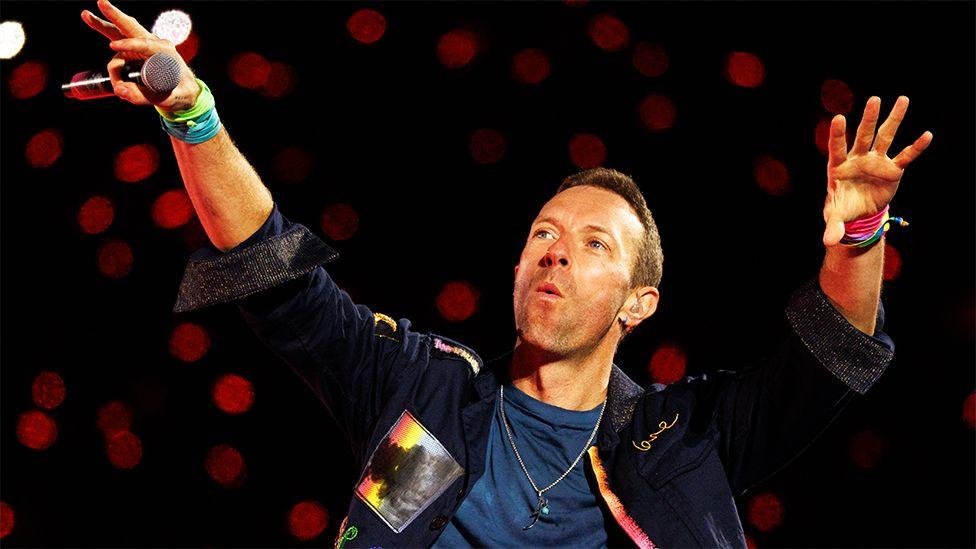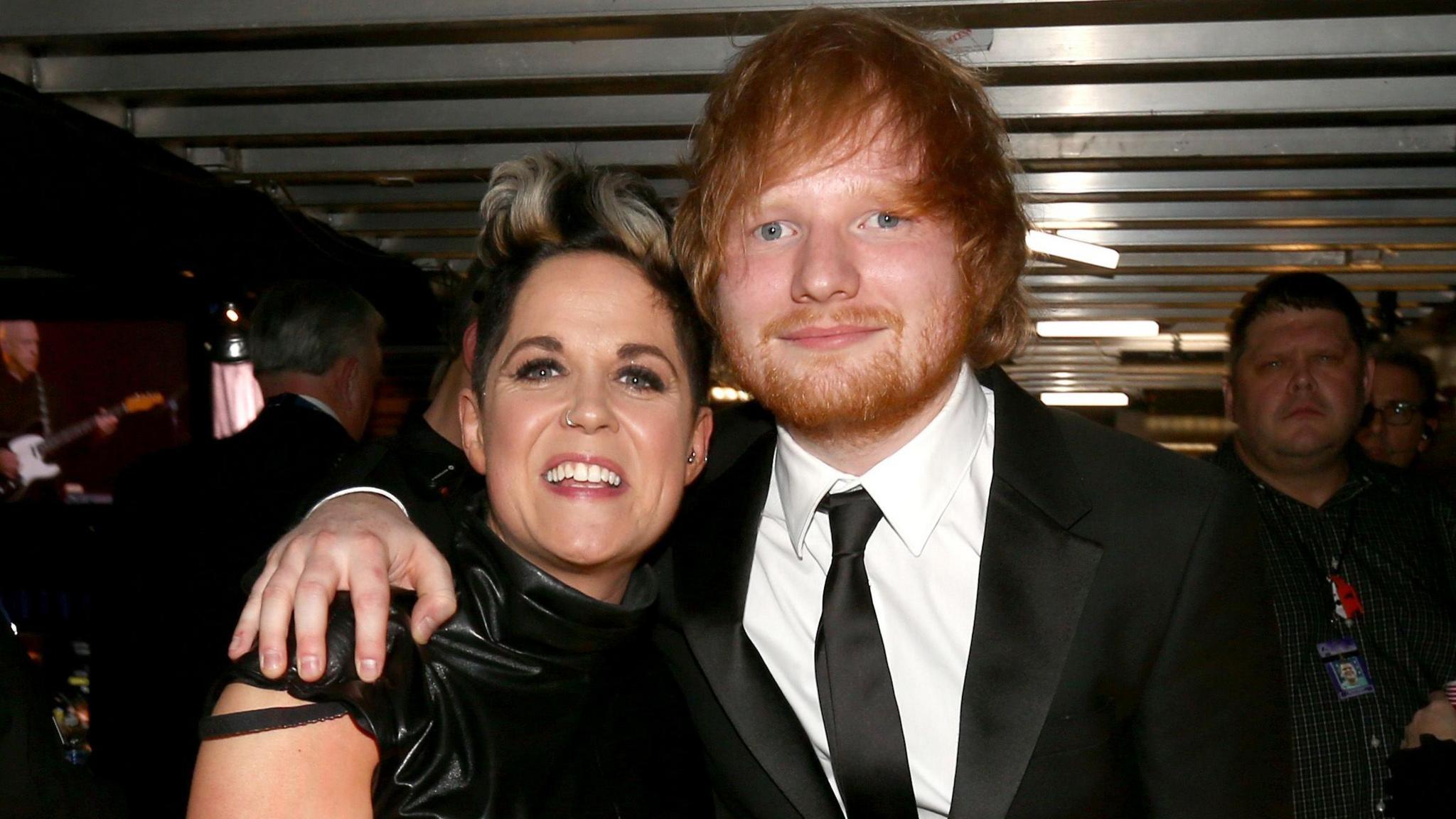Ed Sheeran's Play: Can the pop star reclaim his crown?

Ed Sheeran's eighth album, Play, has been trailled by four singles, including the globe-trotting sounds of Azizam and Sapphire
- Published
Ed Sheeran comes to his eighth album on the back foot.
His last two records, the subdued and introspective Subtract and Autumn Variations, were commercial misfires, selling less than half a million copies each. (His biggest, 2017's Divide, sold 8.4 million in the UK alone).
Those records dealt with weighty topics - the death of his friend Jamal Edwards, and his wife Cherry's diagnosis and recovery from cancer. The songs were cathartic, not designed for chart domination - but for the first time in a long time, Sheeran was left with something to prove.
He gets straight into it on his new record, on an opening track encumbered with the blindingly literal title, "Opening".
"When your career's in a risky place / Everything seems like a big mistake / I'm still looking for [something] to say / Deluding myself that they still relate"
It's a stark admission from one of the most successful artists of his generation. And it raises a genuine question: What does Ed Sheeran sing about when audiences have rejected his most personal songs?

Ed Sheeran is one of the biggest-selling global artists of the 2010 and 2020s
His new album, Play, is in constant pursuit of the answer.
In a press release, he calls it "a direct response" to "the darkest period of my life".
"Coming out of all that, I just wanted to create joy and technicolour, and explore cultures in the countries I was touring."
Over the course of 13 songs, he sings about escape and release, love and devotion - subtly, but confidently, adding Asian and Middle Eastern flavours to his palette.
The sleeve notes credit players of the sitar and the tabla, the Kashmiri santoor and the South Indian kanjira.
You hear the influence most prominently on Symmetry, the story of a late-night tryst, whose propulsive rhythm is adorned by Gujurati drums and the sharp metallic twang of the Banzouki.
On Sapphire - the album's best song - he enlists Indian superstar Arjit Singh for a duet, trading vocals in a mixture of English, Hindi and Punjabi over a lilting beat.
Sheeran is no cultural tourist, though, taking great pains to get the details right. For Sapphire, he travelled 11 hours to Arijit Singh's hometown of Jiaganj to learn the Punjabi-language parts.
This February, he gave a six-city tour of India, playing football with children in Shillong, taking sitar lessons in Mumbai and, in a moment that went viral, getting an impromptu concert shut down by police in Bengaluru.
Moment India police stops Ed Sheeran's street performance
What's frustrating is that the album doesn't reflect these experiences strongly enough.
The Bollywood strings and Asian rhythms are simply assimilated into his brand of frictionless pop. There's nothing on Play that feels as wedded to eastern musical traditions as George Harrison's Within You Without You - or even Shakira's Whenever Wherever.
Take the album's lead single, Azizam. It's named after the Farsi word for "my darling" and features an ear-tingling riff on the santur - a hammered dulcimer of Iranian origin.
Strip away those embellishments, though, and it remains a stubbornly lightweight pop song, based around the same four chords Western music has utilised since Elvis wiggled his hips.
That’s not to say it’s ineffective or disingenuous. Sheeran is simply spreading his bets, making music for the biggest possible number of streaming playlists. And it won't have escaped his attention that Sapphire has become the first song by a Western artist to top India's streaming chart since 2021.
But the sense of squandered opportunity is only heightened when you get to Don't Look Down - a Fred Again collaboration that marries a Bansuri flute motif to a thrumming trance beat.
Combined with a lyric about surviving unspeakable loss, it's one of the most raw and adventurous songs in Sheeran's discography.
Imagine if he'd used that as a template for the entire album.

Sheeran spent a month in India during the making of Play, with many songs recorded in Goa
Instead, a good 50% of the tracks retreat to safer ground - slowly strummed songs of devotion, packed with valentine card sentiments.
"You think you don't have beauty in abundance, but you do," he sings on Camera, recycling the message that One Direction delivered with greater conviction in What Makes You Beautiful.
He's better on In Other Words, a pretty ballad that revels in the tiny details of domestic bliss: "Give me how you check the locks before we sleep... And how without your breakfast tea you're incomplete". It's recorded up close, the hammers audibly striking the piano strings, lending the song a convincing intimacy.
By contrast, A Little More finds Sheeran baring his teeth. Over an ironically jaunty R&B groove he destroys a friend who's exploited their relationship, calling them a "prick" whose hollow apologies belong "in a bin".
It's one of the few moments his nice guy persona comes undone. And, again, it leaves you wondering what else was left unsaid.
On Opening, he alludes to the press intrusion that forces him to wear a disguise when he takes his daughter to the playground; and he briefly addresses the two court cases he faced for plagiarism ("I won both").
Where's that guy for the rest of the album? And why is he still singing about wanting to dance with you at this party?
On Symmetry he even resurrects Shape Of You's analogy of two bodies pulling together like magnets.
Is that a fun call-back, or lazy writing? And what's with the magnets anyway? Maybe it's me, but magnets seem about as sexy as a damp flannel.
But look, Sheeran's way with a tune is inarguable. And while his lyrics can be clumsy, their unguarded simplicity bypasses criticism.
For people inclined to his music (and 200 million album sales suggests that's a big demographic) Play is a compact, enjoyable record that plays to his strengths.
For everyone else, it offers a tantalising glimpse of what Sheeran could achieve if he didn't have his sights permanently trained on streaming algorithms.
Related topics
- Published15 January

- Published10 June

